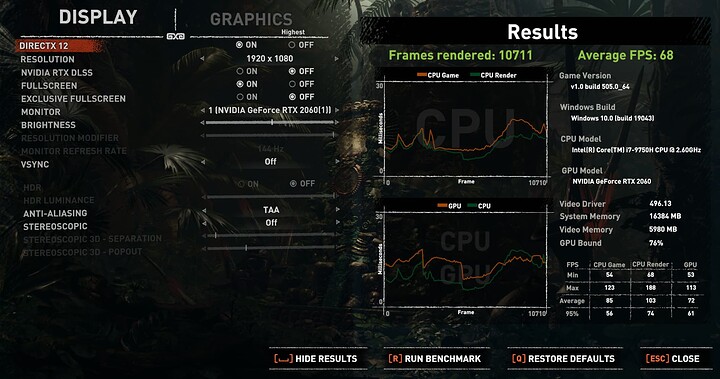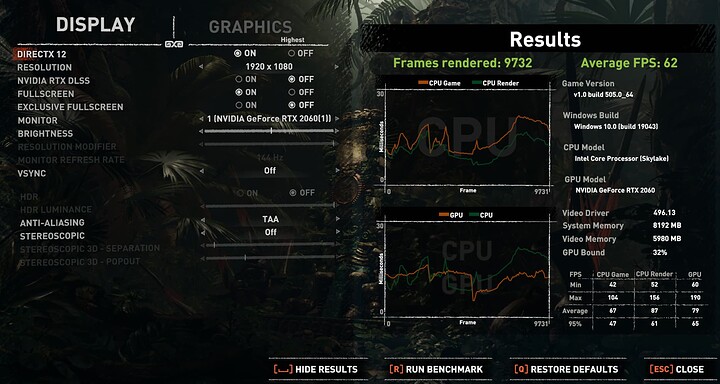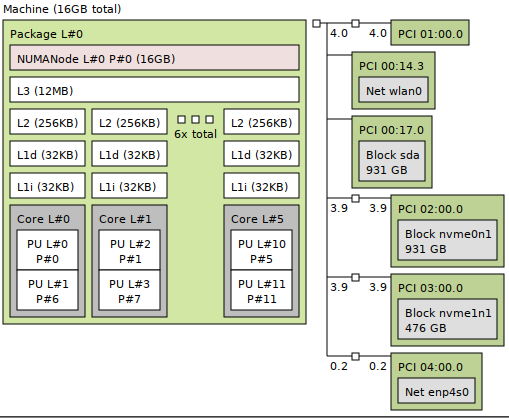I been an entire week trying to pin out what was the issue with my passthrough since games wasn’t working as expected there was decent fps but alot lower than baremetal with about an 20/30 fps loss then for benchmark I tried Shadow of tomb raider demo I noticed in baremetal the cpu is alot better and gpu usage is 70%+ while in vfio the gpu usage is between 20%-36% and cpu fps is very low while GPU fps seems better in vfio after trying countless configs I found someone who instead of host-passthrough cpu config he used custom with the fallback variable and model Skylake-Client so I tried the same config and cpu improved alot compared to old results old was 8300 went to 9700 while baremetal is 10700 but the gpu usage was still very low 36% and cpu fps about 10-20 fps lower and I also noticed in an area of the benchmark where it shows the city the rendering in vfio takes about 2/3 seconds to render everything while in baremetal it renders instantly and I also noticed the cache performance with host-passthrough is very low compared to host-model or custom. I don’t know what to try anymore I had tried cpu pinning, hugepages, isolation, setting governor to performance and everything recommended but still don’t get the performance expected
My setup is an rtx 2060 mobile/ i7 9750h/ 16gb ram
My vfio setup is: rtx 2060 mobile passthrough (single gpu)/i7 9750h Skylake-Client (custom mode) giving 5 cores and 10 threads out of 12 (leaving 0 and its hyperthread 6 to the host) and 8gb ram with pinning/hugepages/dynamic isolation and some enlightements configuration.
Here is my benchmark results in shadow of tomb raider:
Baremetal:
VFIO:
My xml config:
<domain xmlns:qemu="http://libvirt.org/schemas/domain/qemu/1.0" type="kvm">
<name>win10</name>
<uuid>d01cf005-603e-4a77-a43f-fe7f220cff32</uuid>
<metadata>
<libosinfo:libosinfo xmlns:libosinfo="http://libosinfo.org/xmlns/libvirt/domain/1.0">
<libosinfo:os id="http://microsoft.com/win/10"/>
</libosinfo:libosinfo>
</metadata>
<memory unit="KiB">8388608</memory>
<currentMemory unit="KiB">8388608</currentMemory>
<memoryBacking>
<hugepages/>
</memoryBacking>
<vcpu placement="static">10</vcpu>
<cputune>
<vcpupin vcpu="0" cpuset="1"/>
<vcpupin vcpu="1" cpuset="7"/>
<vcpupin vcpu="2" cpuset="2"/>
<vcpupin vcpu="3" cpuset="8"/>
<vcpupin vcpu="4" cpuset="3"/>
<vcpupin vcpu="5" cpuset="9"/>
<vcpupin vcpu="6" cpuset="4"/>
<vcpupin vcpu="7" cpuset="10"/>
<vcpupin vcpu="8" cpuset="5"/>
<vcpupin vcpu="9" cpuset="11"/>
<emulatorpin cpuset="0,6"/>
</cputune>
<os>
<type arch="x86_64" machine="pc-q35-6.1">hvm</type>
<loader readonly="yes" type="pflash">/usr/share/edk2-ovmf/x64/OVMF_CODE.fd</loader>
<nvram>/var/lib/libvirt/qemu/nvram/win10_VARS.fd</nvram>
<bootmenu enable="no"/>
</os>
<features>
<acpi/>
<apic/>
<hyperv>
<relaxed state="on"/>
<vapic state="on"/>
<spinlocks state="on" retries="8191"/>
<vpindex state="on"/>
<synic state="on"/>
<stimer state="on"/>
<reset state="on"/>
<vendor_id state="on" value="whatever"/>
<frequencies state="on"/>
</hyperv>
<kvm>
<hidden state="on"/>
</kvm>
<vmport state="off"/>
<ioapic driver="kvm"/>
</features>
<cpu mode="custom" match="exact" check="none">
<model fallback="allow">Skylake-Client</model>
<topology sockets="1" dies="1" cores="5" threads="2"/>
</cpu>
<clock offset="localtime">
<timer name="rtc" present="no" tickpolicy="catchup"/>
<timer name="pit" present="no" tickpolicy="delay"/>
<timer name="hpet" present="no"/>
<timer name="kvmclock" present="no"/>
<timer name="hypervclock" present="yes"/>
</clock>
<on_poweroff>destroy</on_poweroff>
<on_reboot>destroy</on_reboot>
<on_crash>destroy</on_crash>
<pm>
<suspend-to-mem enabled="no"/>
<suspend-to-disk enabled="no"/>
</pm>
<devices>
<emulator>/usr/bin/qemu-system-x86_64</emulator>
<controller type="usb" index="0" model="qemu-xhci" ports="15">
<address type="pci" domain="0x0000" bus="0x01" slot="0x00" function="0x0"/>
</controller>
<controller type="pci" index="0" model="pcie-root"/>
<controller type="pci" index="1" model="pcie-root-port">
<model name="pcie-root-port"/>
<target chassis="1" port="0x10"/>
<address type="pci" domain="0x0000" bus="0x00" slot="0x02" function="0x0" multifunction="on"/>
</controller>
<controller type="pci" index="2" model="pcie-root-port">
<model name="pcie-root-port"/>
<target chassis="2" port="0x11"/>
<address type="pci" domain="0x0000" bus="0x00" slot="0x02" function="0x1"/>
</controller>
<controller type="pci" index="3" model="pcie-root-port">
<model name="pcie-root-port"/>
<target chassis="3" port="0x12"/>
<address type="pci" domain="0x0000" bus="0x00" slot="0x02" function="0x2"/>
</controller>
<controller type="pci" index="4" model="pcie-root-port">
<model name="pcie-root-port"/>
<target chassis="4" port="0x13"/>
<address type="pci" domain="0x0000" bus="0x00" slot="0x02" function="0x3"/>
</controller>
<controller type="pci" index="5" model="pcie-root-port">
<model name="pcie-root-port"/>
<target chassis="5" port="0x14"/>
<address type="pci" domain="0x0000" bus="0x00" slot="0x02" function="0x4"/>
</controller>
<controller type="pci" index="6" model="pcie-root-port">
<model name="pcie-root-port"/>
<target chassis="6" port="0x8"/>
<address type="pci" domain="0x0000" bus="0x00" slot="0x01" function="0x0" multifunction="on"/>
</controller>
<controller type="pci" index="7" model="pcie-root-port">
<model name="pcie-root-port"/>
<target chassis="7" port="0x9"/>
<address type="pci" domain="0x0000" bus="0x00" slot="0x01" function="0x1"/>
</controller>
<controller type="pci" index="8" model="pcie-root-port">
<model name="pcie-root-port"/>
<target chassis="8" port="0xa"/>
<address type="pci" domain="0x0000" bus="0x00" slot="0x01" function="0x2"/>
</controller>
<controller type="pci" index="9" model="pcie-root-port">
<model name="pcie-root-port"/>
<target chassis="9" port="0xb"/>
<address type="pci" domain="0x0000" bus="0x00" slot="0x01" function="0x3"/>
</controller>
<controller type="pci" index="10" model="pcie-to-pci-bridge">
<model name="pcie-pci-bridge"/>
<address type="pci" domain="0x0000" bus="0x02" slot="0x00" function="0x0"/>
</controller>
<controller type="sata" index="0">
<address type="pci" domain="0x0000" bus="0x00" slot="0x1f" function="0x2"/>
</controller>
<input type="mouse" bus="ps2"/>
<input type="keyboard" bus="ps2"/>
<audio id="1" type="spice"/>
<hostdev mode="subsystem" type="pci" managed="yes">
<source>
<address domain="0x0000" bus="0x02" slot="0x00" function="0x0"/>
</source>
<boot order="1"/>
<address type="pci" domain="0x0000" bus="0x03" slot="0x00" function="0x0"/>
</hostdev>
<hostdev mode="subsystem" type="pci" managed="yes">
<source>
<address domain="0x0000" bus="0x01" slot="0x00" function="0x0"/>
</source>
<rom file="/home/akarin/patched.rom"/>
<address type="pci" domain="0x0000" bus="0x05" slot="0x00" function="0x0"/>
</hostdev>
<hostdev mode="subsystem" type="pci" managed="yes">
<source>
<address domain="0x0000" bus="0x01" slot="0x00" function="0x1"/>
</source>
<rom file="/home/akarin/patched.rom"/>
<address type="pci" domain="0x0000" bus="0x06" slot="0x00" function="0x0"/>
</hostdev>
<hostdev mode="subsystem" type="pci" managed="yes">
<source>
<address domain="0x0000" bus="0x01" slot="0x00" function="0x2"/>
</source>
<rom file="/home/akarin/patched.rom"/>
<address type="pci" domain="0x0000" bus="0x07" slot="0x00" function="0x0"/>
</hostdev>
<hostdev mode="subsystem" type="pci" managed="yes">
<source>
<address domain="0x0000" bus="0x01" slot="0x00" function="0x3"/>
</source>
<rom file="/home/akarin/patched.rom"/>
<address type="pci" domain="0x0000" bus="0x08" slot="0x00" function="0x0"/>
</hostdev>
<hostdev mode="subsystem" type="pci" managed="yes">
<source>
<address domain="0x0000" bus="0x00" slot="0x14" function="0x0"/>
</source>
<address type="pci" domain="0x0000" bus="0x0a" slot="0x01" function="0x0"/>
</hostdev>
<memballoon model="none"/>
</devices>
<qemu:commandline>
<qemu:arg value="-acpitable"/>
<qemu:arg value="file=/home/akarin/SSDT1.dat"/>
<qemu:arg value="-object"/>
<qemu:arg value="input-linux,id=kbd,evdev=/dev/input/event3,grab_all=on,repeat=on"/>
<qemu:env name="PIPEWIRE_RUNTIME_DIR" value="/run/user/1000"/>
<qemu:env name="PIPEWIRE_LATENCY" value="512/48000"/>
</qemu:commandline>
</domain>




 at first I thought it was a core-thread mismatch, but now I’m really not sure what tot think.
at first I thought it was a core-thread mismatch, but now I’m really not sure what tot think.